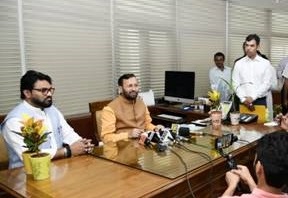
In Focus
Shibabrata Mondal, Founder and CEO
Wizergos
Low-code, no-code is poised to be a digital transformation catalyst.
Enterprises globally and in India have to contend with pressures to deliver products and services with speed to account for rapidly evolving customer requirements and ensure business resiliency at all times. The “low-code, no-code” theme has never been more dominant especially since the onset of the current pandemic. It would not be an exaggeration to mention that a direct fallout of the pandemic has been an acceleration of digital transformation initiatives, which is where most of the action in enterprises lies currently.
Wizergos has developed its low-code platform to cater to enterprises’ rapid development needs in the wake of the ongoing rush for digital transformation.
Better World conducted an email interview with Shibabrata Mondal, Founder and CEO, Wizergos, to gauge the present and future potential of the low-code paradigm and how organizations can use it optimally.
Excerpts of the interview:
Better World: Of late, there has been a lot of buzz in the industry for low-code/no-code application development platforms. Please explain why organizations should explore these platforms for app development.
Shibabrata Mondal: To explain the evolution and value of low-code/no-code platforms, I believe it is pertinent for us to go back in time and consider the history of computer science in general and software development specifically. There has always been an effort to provide tools and systems to enable developing high quality, complex, and enterprise-grade software while considering the business requirements of agility and ease of use.
So, the progression from machine language, micro code to C/C++ to Java/Python, or the various development frameworks was necessitated with the aim to make software development easier, more accessible, more robust and error free at the same time. Similarly, the concepts of libraries/packages, or the more recently introduced microservices and APIs are also advancements in the same direction. To me, low-code/no-code is but a natural extension of this movement. These platforms allow developers with no programming experience and even business users to build and publish applications using a web-based drag and drop kind of experience.
In such projects, enterprises are building some custom applications for enhanced user experience and management or automating some business processes. These are also projects where the requirements and functionalities would be controlled by the business teams. And by nature these would need quick updates as new products or services are introduced or changes are set in motion in processes or regulatory environments. So, these solutions have to be architected such that they are not only built rapidly and go to market quickly, but also changes can be done in matter of hours and days instead of weeks and months. Speed, agility, and quicker time to market are tenets of the value proposition of low-code/ no-code platforms that the tech buyer community must actively consider.
Better World: In this low-code/no-code evolution, how is Wizergos positioned to help organizations? Please help us understand Wizergos’ origin and vision.
Shibabrata Mondal, Founder and CEO, Wizergos
Shibabrata Mondal: We started Wizergos Low-Code Platform with three key theses that we placed our bets on. First, increasingly enterprise software development activities will be carried out for digital transformation projects, with requirements driven by business teams, tighter time to market requirements, and the need for rapid changes to address evolving needs in the market and business. These need a different architectural approach and traditional software development methods and tools will not be able to serve these needs effectively. Second, going forward, enterprise software needs to be available in a multitude of channels where the customers are more likely to be present. Low-code platforms would be required to natively make multi-device, multi-touchpoint, multi-modal applications. For instance, web and mobile apps, along with capabilities embedded in wearable devices, popular chat platforms (like WhatsApp, FB messenger), voice, and email. Lastly, we observed that enterprises are experimenting with new technologies like AI/ML and AR/VR and are not successful in developing multiple enterprise-grade, production ready use cases. Here too we posited that a platform approach is needed to bring these technologies to production use cases.
With these theses as our guide, we have built the Wizergos Low-Code Platform, and continue to focus our efforts in augmenting it. Our focus is on working with clients on projects where all or some of these points are coming together to build a business case for low-code platforms.
Better World: What is the current business traction for Wizergos in India and globally? Which customer segments and use cases are you working with?
Shibabrata Mondal: Two years ago, we spent time exploring and co-creating applications for a select number of use cases to prove the value of our platform. Since then, I am pleased, we have grown with a steady business traction and projects. One of our largest and most successful projects is with ICICI Lombard where we have leveraged our low-code platform to process over one million support workflows for customers every month (in their contact center set up) and significantly increased First-Call-Resolution rates for its Customer Service teams. This has ensured our sustained engagement with them for several new use cases. We have also empowered Fidelis Insurance (UK), and a market research firm and ITC for market research applications over WhatsApp. Additionally, we have also developed mobile applications for several product engineering companies using our Low-Code platform.
We believe that Wizergos Low-Code Platform is a horizontal solution and will find application in multiple industries. Currently, we are focusing on the BFSI sector considering the volume and quality of digital transformation projects in this sector, combined with relatively higher technology maturity of BFSI companies that enables them to explore emerging technologies such as low-code/ no-code.
Better World: Going forward, how do you see the Low-code/no-code industry as a whole evolving (w.r.t. customer adoption, challenges, and so on)?
Shibabrata Mondal: I think adoption of low-code platforms will accelerate in the near to mid-term, as more success stories are seen and IT leaders realize some distinct advantages of using these platforms, viz. low maintenance, quicker enhancements to their software capabilities leading to faster time to market, robustness of applications, and so on.
Additionally, with the realization of early successes, organizations will plan low-code expansion drives for a slew of their DX initiatives across several business functions. This view is supported by research conducted by leading firms. The worldwide Low-Code development technologies market is slated to be worth USD13.8 billion in 2021 (registering around 22.6% annual growth), as per a Gartner report. In the same vein, Gartner predicts that by 2023, over 50% of medium to large enterprises will have adopted a low-code application platform as one of their strategic application platforms.
One of the challenges I see is for enterprises to figure use cases for low-code and no-code because, although we are putting all the platforms together as a category currently, they are quite different from each other in terms of what use cases they were designed for and where each one excels. Going forward there might be sub-categories created to help the enterprises make the right decisions. Additionally, organizations also need support to evaluate the appropriate low-code/ no-code platform vendors to engage with.
Better World: Could you please highlight some key priorities for Wizergos to tap the opportunities/address customer challenges moving ahead?
Shibabrata Mondal: Having executed several deep enterprise projects with larger established enterprises has made us more confident of our theories and vision and propelled us for our next wave of growth.
Our immediate priority is a focused approach towards expanding our business in select industry verticals – we intend to leverage our expertise and initial traction to build further inroads into insurance, banking, and financial services companies. It is also our responsibility as an industry stakeholder to help spread awareness about the value of low-code platforms, as we have noticed that low-code platforms can be very confusing for IT leaders and so decision making can be slow. To support the decision-making process of the tech leaders, we are working on a compendium of use cases and success stories to help them make the right decisions. As a key pillar of our GTM strategy, partner expansion is another priority area for us going ahead in the near to mid-term.
To read more InFocus interviews, click here.






0 Comments